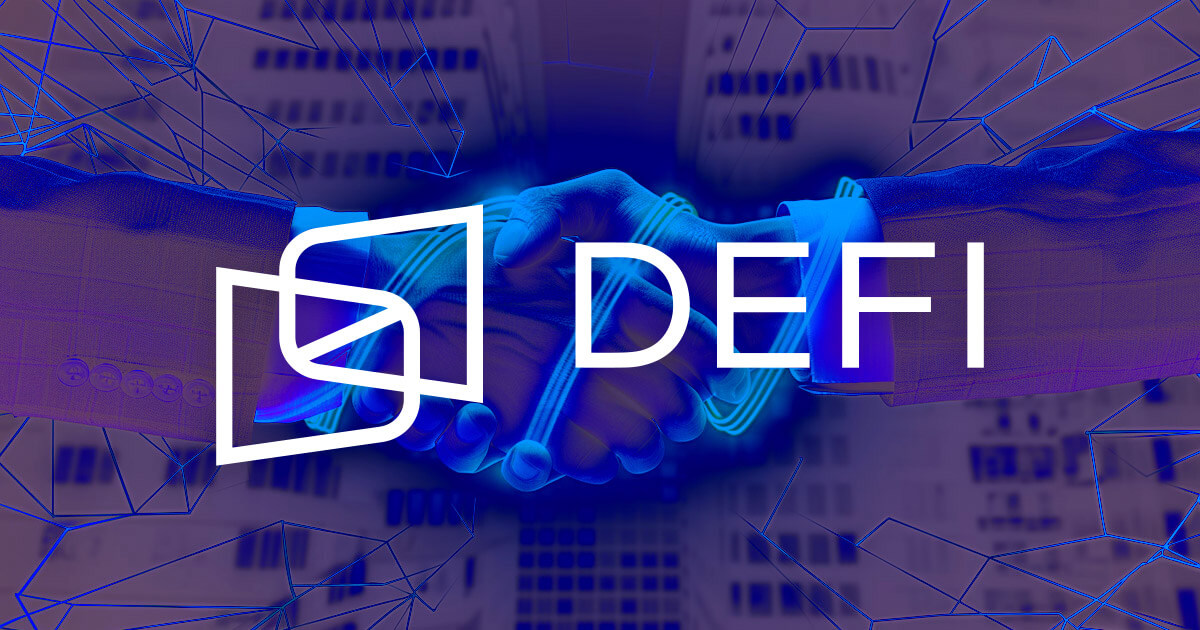DeFi
Unveiling The Players Of 2024

June 6, 2024 by Diana Ambolis
42
The institutional crypto lending market is a dynamic landscape with a growing number of players vying for a piece of the pie. Let’s delve into the key players, analyze their offerings, and explore the evolving competitive landscape. Institutional Crypto Lending Platforms: Unveiling the Players of 2024 As the cryptocurrency market matures and institutional adoption gathers
The institutional crypto lending market is a dynamic landscape with a growing number of players vying for a piece of the pie. Let’s delve into the key players, analyze their offerings, and explore the evolving competitive landscape.
Institutional Crypto Lending Platforms: Unveiling the Players of 2024
As the cryptocurrency market matures and institutional adoption gathers pace, the demand for secure and reliable crypto lending platforms tailored for sophisticated investors is skyrocketing. In 2024, a vibrant landscape of institutional crypto lending platforms is poised to shape the future of digital asset financing. Here, we delve into the key players, their unique offerings, and the evolving dynamics of this dynamic market:
The Established Players: A Legacy of Trust and Security
- Bakkt (Intercontinental Exchange): Leveraging the heritage and trust of the Intercontinental Exchange (ICE), Bakkt offers a regulated and institutional-grade platform for crypto custody, trading, and lending. Catering to large institutions and accredited investors, Bakkt prioritizes security, compliance, and seamless integration with existing financial infrastructure.
- Fidelity Digital Assets: A subsidiary of the financial services giant Fidelity Investments, Fidelity Digital Assets provides a comprehensive suite of crypto custody, trading, and lending solutions for institutional clients. Their focus on institutional-grade security, regulatory compliance, and deep industry expertise positions them as a trusted partner for large investors entering the crypto space.
- State Street Digital: State Street, a leading global custodian bank, has established State Street Digital, a dedicated platform offering secure custody, trading, and financing solutions for digital assets. Leveraging their established relationships with institutional investors and robust risk management practices, State Street Digital fosters trust and facilitates the entry of traditional finance players into the crypto lending market.
The Rising Stars: Innovation and Niche Expertise
- BlockFi: A pioneer in the retail crypto lending space, BlockFi is expanding its offerings to cater to institutional investors. BlockFi emphasizes high-yield interest accounts on deposited crypto assets, catering to institutions seeking attractive returns on their digital holdings. Their user-friendly platform and focus on transparency are attracting a growing base of institutional clients.
- Celsius Network: Another player transitioning from retail to institutional crypto lending, Celsius Network boasts a unique model that rewards users with its native CEL token for holding assets on their platform. This value proposition, coupled with competitive interest rates, is attracting institutions seeking a combination of yield and potential token appreciation.
- Genesis (Digital Currency Group): A subsidiary of Digital Currency Group, Genesis is a prominent institutional crypto prime brokerage offering a wide range of services, including lending, over-the-counter (OTC) trading, and asset management. Their focus on deep liquidity, customized solutions, and strong credit risk management caters to the specific needs of hedge funds, asset managers, and other sophisticated investors.
The Decentralized Disruptors: DeFi Lending Protocols
- Compound: A leading decentralized finance (DeFi) protocol, Compound allows institutions to lend and borrow crypto assets in a permissionless and transparent manner. Leveraging smart contracts and automated liquidity pools, Compound offers competitive interest rates and eliminates the need for intermediaries, potentially disrupting traditional lending models.
- Aave: Another prominent DeFi lending protocol, Aave provides a flexible platform where institutions can lend and borrow a wider range of crypto assets compared to centralized platforms. Its focus on community governance and innovative features like flash loans is attracting institutions seeking a more dynamic and customizable lending experience.
- MakerDAO: The pioneer of decentralized stablecoin lending, MakerDAO allows institutions to mint DAI, a decentralized stablecoin pegged to the US dollar, by depositing crypto assets as collateral. This innovative model offers a unique way for institutions to access USD liquidity without relying on traditional financial channels.
The Evolving Landscape: Key Considerations for Institutional Investors
- Regulation and Compliance: Regulatory uncertainty and evolving compliance requirements remain key considerations for institutional investors. Platforms with robust compliance frameworks, clear risk management practices, and a commitment to regulatory adherence will be well-positioned to attract institutional capital.
- Security and Custody: The security of digital assets is paramount for institutional investors. Platforms with a proven track record of secure custody solutions, robust insurance policies, and rigorous penetration testing will be favored by risk-averse institutions.
- Liquidity and Counterparty Risk: Institutional investors require deep liquidity pools to ensure efficient execution of large-scale lending and borrowing transactions. Platforms with strong partnerships with other institutions and robust risk management practices will mitigate counterparty risk and ensure the timely settlement of transactions.
- Yield and Risk Management: Maximizing returns while managing risk is crucial for institutional investors. Platforms offering competitive interest rates, flexible lending options, and sophisticated risk management tools will attract institutions seeking optimal returns on their crypto investments.
Collaborative Future for Institutional Crypto Lending
The institutional crypto lending market in 2024 promises to be a dynamic space characterized by collaboration and competition. Established players with a legacy of trust and security will vie for market share with innovative DeFi protocols offering decentralized lending solutions. Ultimately, institutional investors will benefit from a diverse range of platforms
The Competitive Landscape: New Entrants and Strategic Alliances
The institutional crypto lending space is attracting new entrants, further intensifying the competition and fostering innovation. Here, we explore the influx of new players and the strategic alliances being forged in this dynamic market:
New Entrants: Disrupting the Status Quo
- Traditional Financial Institutions: Major investment banks, commercial banks, and asset management firms are actively exploring the launch of their own institutional crypto lending platforms. Their established infrastructure, regulatory expertise, and existing client relationships position them as potential game-changers in the market. However, overcoming internal resistance to crypto adoption and navigating complex regulatory hurdles remain challenges they need to address.
- Crypto-Native Custodians: Existing crypto custody providers are expanding their offerings to encompass lending services. Their deep understanding of the crypto ecosystem, secure custody solutions, and established client base in the crypto space give them a significant competitive edge. However, they may need to bolster their experience in traditional finance and risk management to cater effectively to the needs of institutional investors.
- FinTech Startups: Agile and innovative FinTech startups are emerging with specialized crypto lending platforms targeting specific niches within the institutional investor landscape. Their focus on cutting-edge technology, user-friendly interfaces, and niche expertise allows them to cater to specific investor needs. However, building trust and brand recognition in a crowded market and competing with established players for market share are key challenges they face.
Strategic Alliances: A Collaborative Approach to Growth
- Legacy Finance and Crypto Expertise: Established financial institutions are forging strategic partnerships with crypto-native platforms to leverage their expertise in crypto custody, lending protocols, and market insights. These collaborations bridge the gap between traditional finance and the crypto ecosystem, fostering innovation and accelerating institutional adoption of crypto lending services.
- DeFi Integration with TradFi Infrastructure: DeFi lending protocols are exploring partnerships with traditional financial institutions to leverage their established infrastructure and regulatory expertise. This integration could allow DeFi protocols to offer their competitive interest rates and seamless lending experience to a wider range of institutional investors, while traditional institutions gain exposure to the innovative potential of DeFi.
- Consortium Models for Risk Mitigation: Collaboration among multiple institutions to create consortium-based lending platforms is a nascent trend. By sharing the risks and rewards associated with crypto lending, these consortiums can mitigate counterparty risk and attract a broader pool of institutional investors seeking a more diversified approach to crypto exposure.
The Impact of New Entrants and Alliances
The influx of new entrants and the formation of strategic alliances will significantly impact the institutional crypto lending landscape in several ways:
- Increased Competition and Innovation: The entry of new players will intensify competition, leading to more competitive interest rates, innovative lending products, and a wider range of services tailored to meet the specific needs of various institutional investors.
- Enhanced Security and Regulatory Compliance: New entrants with established expertise in traditional finance can contribute to enhanced security protocols and robust compliance frameworks within the crypto lending space. This will foster trust and confidence among institutional investors with stringent risk management requirements.
- Improved Liquidity and Market Efficiency: The combined efforts of established players and new entrants will contribute to deeper liquidity pools within the institutional crypto lending market. This ensures efficient execution of large-scale transactions and fosters greater market stability.
- Democratization of Crypto Lending: Strategic alliances between DeFi protocols and traditional financial institutions can potentially democratize access to crypto lending services. A wider range of institutional investors, from large hedge funds to smaller asset managers, will gain access to this innovative financing tool.
A Thriving Ecosystem for the Future
The institutional crypto lending space is poised for significant growth and transformation. The influx of new entrants, coupled with the formation of strategic alliances, will create a thriving ecosystem characterized by fierce competition, continuous innovation, and a focus on security, compliance, and risk management. As this market matures, institutional investors will benefit from a diverse range of lending platforms, sophisticated products, and competitive interest rates, ultimately unlocking the full potential of crypto lending in the financial landscape.
The Future Unfolds: A Maturing Market
The competitive landscape for institutional crypto lending is likely to become increasingly crowded. As the market matures, we can expect to see several key trends emerge:
- Regulation and Standardization: Regulatory clarity and the establishment of standardized practices will be crucial for fostering long-term institutional adoption. Governments and industry bodies are likely to collaborate on developing clear regulatory frameworks that address issues like anti-money laundering (AML) and Know Your Customer (KYC) compliance, while promoting innovation and mitigating systemic risks.
- Focus on User Experience and Automation: Platforms will prioritize user experience by offering intuitive interfaces, streamlined onboarding processes, and advanced analytics tools. Automation of key tasks, such as collateral management and risk assessment, will become increasingly prevalent, improving efficiency and reducing operational costs for both lenders and borrowers.
- Integration with Traditional Finance: Seamless integration with existing financial infrastructure will be essential for widespread institutional adoption. This may involve the development of standardized messaging protocols, interoperability between traditional and crypto lending platforms, and the creation of regulated crypto custody solutions.
- The Rise of Tokenization: The tokenization of traditional assets like real estate, debt, and private equity is expected to unlock new opportunities for institutional crypto lending. Tokenized assets can be easily fractionated and traded on secondary markets, facilitating greater liquidity and attracting a broader range of institutional investors.
- Convergence of DeFi and CeFi: A potential convergence of Decentralized Finance (DeFi) and Centralized Finance (CeFi) could emerge. DeFi lending protocols may integrate features like regulatory compliance and KYC procedures to attract institutional investors, while CeFi platforms may incorporate elements of DeFi, such as permissionless lending and automated market makers, to offer more competitive rates and innovative products.
The Evolving Role of Institutional Investors
As the institutional crypto lending market matures, we can expect to see a shift in the role of institutional investors:
- From Early Adopters to Market Makers: Early adopters who entered the market for speculative purposes may transition to a more strategic role, acting as market makers by providing liquidity and facilitating efficient price discovery within the crypto lending ecosystem.
- Increased Demand for Diversification and Yield Enhancement: Institutional investors will continue to seek out crypto lending as a means to diversify their portfolios and generate attractive returns in a low-interest-rate environment. Platforms offering a wider range of crypto assets, innovative lending products, and sophisticated risk management tools will be well-positioned to cater to these demands.
- Active Participation in Governance: Institutional investors with a vested interest in the long-term sustainability of the market may become more actively involved in the governance of DeFi lending protocols. This could involve shaping protocol parameters, proposing upgrades, and contributing to the overall health and security of the DeFi ecosystem.
A Bright Future for Institutional Crypto Lending
The future of institutional crypto lending is undeniably bright. As the market matures, regulations evolve, and technology advances, we can expect to see a vibrant ecosystem emerge, characterized by fierce competition, innovation, and a focus on security, compliance, and risk management. This will ultimately unlock the full potential of crypto lending, transforming the way institutional investors access liquidity, manage their crypto holdings, and participate in the burgeoning digital asset economy. By staying informed about the evolving landscape and adapting their strategies accordingly, institutional investors can seize the vast opportunities presented by this transformative financial instrument.
Also, read – Staking vs. Lending Crypto: Top 10 Amazing Ways to Maximize Your Returns In A Bear Market
Conclusion: A Buyer’s Market for Institutions
The expanding pool of institutional crypto lending platforms offers a buyer’s market for institutions. By carefully comparing loan terms, interest rates, security features, and the overall client experience, institutions can select a platform that best aligns with their specific needs and risk tolerance. As the market matures and competition intensifies, innovation, security, and exceptional client service will be the key drivers of success for institutional crypto lending platforms.
DeFi
Pump.Fun is revolutionizing the Ethereum blockchain in terms of daily revenue

The memecoin launchpad saw the largest daily revenue in all of DeFi over the past 24 hours.
Memecoin launchpad Pump.Fun has recorded the highest gross revenue in all of decentralized finance (DeFi) in the last 24 hours, surpassing even Ethereum.
The platform has raised $867,429 in the past 24 hours, compared to $844,276 for Ethereum, according to DeFiLlama. Solana-based Telegram trading bot Trojan was the third-highest revenue generator of the day, as memecoin infrastructure continues to dominate in DeFi.
Pump.Fun generates $315 million in annualized revenue according to DeFiLlama, and has averaged $906,160 per day over the past week.
Income Ranking – Source: DeFiLlama
The memecoin frenzy of the past few months is behind Pump.fun’s dominance. Solana-based memecoins have been the main drug of choice for on-chain degenerates.
The app allows non-technical users to launch their own tokens in minutes. Users can spend as little as $2 to launch their token and are not required to provide liquidity up front. Pump.Fun allows new tokens to trade along a bonding curve until they reach a set market cap of around $75,000, after which the bonding curve will then be burned on Raydium to create a safe liquidity pool.
Pump.Fun generates revenue through accrued fees. The platform charges a 1% fee on transactions that take place on the platform. Once a token is bonded and burned on Raydium, Pump.fun is no longer able to charge the 1% fee.
Ethereum is the blockchain of the second-largest cryptocurrency, Ether, with a market cap of $395 billion. It powers hundreds of applications and thousands of digital assets, and backs over $60 billion in value in smart contracts.
Ethereum generates revenue when users pay fees, called gas and denominated in ETH, to execute transactions and smart contracts.
DeFi
DeFi technologies will improve trading desk with zero-knowledge proofs

DeFi Technologies, a Canadian company financial technology companyis set to enhance its trading infrastructure through a new partnership with Zero Computing, according to a July 30 statement shared with CryptoSlate.
The collaboration aims to integrate zero-knowledge proof tools to boost operations on the Solana And Ethereum blockchains by optimizing its ability to identify and execute arbitrage opportunities.
Additionally, it will improve the performance of its DeFi Alpha trading desk by enhancing its use of ZK-enabled maximum extractable value (MEV Strategies).
Zero knowledge Proof of concept (ZKP) technology provides an additional layer of encryption to ensure transaction confidentiality and has recently been widely adopted in cryptographic applications.
Optimization of trading strategies
DeFi Technologies plans to use these tools to refine DeFi Alpha’s ability to spot low-risk arbitrage opportunities. The trading desk has already generated nearly $100 million in revenue this year, and this new partnership is expected to further enhance its algorithmic strategies and market analysis capabilities.
Zero Computing technology will integrate ZKP’s advanced features into DeFi Alpha’s infrastructure. This upgrade will streamline trading processes, improve transaction privacy, and increase operational efficiency.
According to DeFi Technologies, these improvements will increase the security and sophistication of DeFi Alpha’s trading strategies.
The collaboration will also advance commercial approaches for ZK-enabled MEVs, a new concept in Motor vehicles which focuses on maximizing value through transaction fees and arbitrage opportunities within block production.
Additionally, DeFi Technologies plans to leverage Zero Computing technology to develop new financial products, such as zero-knowledge index exchange-traded products (ETPs).
Olivier Roussy Newton, CEO of DeFi Technologies, said:
“By integrating their cutting-edge zero-knowledge technology, we not only improve the efficiency and privacy of our transactions, but we also pave the way for innovative trading strategies.”
Extending Verifiable Computing to Solana
According to the release, Zero Computing has created a versatile, chain-agnostic platform for generating zero-knowledge proofs. The platform currently supports Ethereum and Solana, and the company plans to expand compatibility with other blockchains in the future.
The company added that it is at the forefront of introducing verifiable computation to the Solana blockchain, enabling complex computations to be executed off-chain with on-chain verification. This development represents a significant step in the expansion of ZKPs across various blockchain ecosystems.
Mentioned in this article
Latest Alpha Market Report
DeFi
Elastos’ BeL2 Secures Starknet Grant to Advance Native Bitcoin Lending and DeFi Solutions

Singapore, Asia, July 29, 2024, Chainwire
- Elastos BeL2 to Partner with StarkWare to Integrate Starknet’s ZKPs and Cairo Programming Language with BeL2 for Native DeFi Applications
- Starknet integration allows BeL2 to provide smart contracts and dapps without moving Bitcoin assets off the mainnet
- Starknet Exchange Validates the Strength of BeL2’s Innovation and Leadership in the Native Bitcoin Ecosystem
Elastos BeL2 (Bitcoin Elastos Layer2) has secured a $25,000 grant from Starknet, a technology leader in the field of zero-knowledge proofs (ZKPs). This significant approval highlights the Elastos BeL2 infrastructure and its critical role in advancing Bitcoin-native DeFi, particularly Bitcoin-native lending. By integrating Starknet’s ZKPs and the Cairo programming language, Elastos’ BeL2 will enhance its ability to deliver smart contracts and decentralized applications (dapps) without moving Bitcoin (BTC) assets off the mainnet. This strategic partnership with Starknet demonstrates the growing acceptance and maturity of the BeL2 infrastructure, reinforcing Elastos’ commitment to market leadership in the evolving Bitcoin DeFi market.
Starknet, developed by StarkWare, is known for its advancements in ZKP technology, which improves the privacy and security of blockchain transactions. ZKPs allow one party to prove to another that a statement is true without revealing any information beyond the validity of the statement itself. This technology is fundamental to the evolution of blockchain networks, which will improve BeL2’s ability to integrate complex smart contracts while preserving the integrity and security of Bitcoin.
“We are thrilled to receive this grant from Starknet and announce our partnership to build tighter integrations with its ZKP technology and the Cairo programming language,” said Sasha Mitchell, Head of Bitcoin Layer 2 at Elastos. “This is a major milestone for BeL2 and a true recognition of the maturity and capabilities of our core technology. This support will allow us to further develop our innovation in native Bitcoin lending as we look to capitalize on the growing acceptance of Bitcoin as a viable alternative financial system.”
A closer integration with Cairo will allow BeL2 to leverage this powerful programming language to enhance Bitcoin’s capabilities and deliver secure, efficient, and scalable decentralized finance (DeFi) applications. Specifically, the relationship with Cairo reinforces BeL2’s core technical innovations, including:
- ZKPs ensure secure and private verification of transactions
- Decentralized Arbitrage Using Collateralized Nodes to Supervise and Enforce Fairness in Native Bitcoin DeFi
- BTC Oracle (NYSE:) facilitates cross-chain interactions where information, not assets, is exchanged while Bitcoin remains on the main infrastructure
BeL2’s vision goes beyond technical innovation and aims to innovate by creating a new financial system. The goal is to build a Bitcoin-backed Bretton Woods system, address global debt crises, and strengthen Bitcoin’s role as a global hard currency. This new system will be anchored in the integrity and security of Bitcoin, providing a stable foundation for decentralized financial applications.
As integration with Starknet and the Cairo programming language continues, BeL2 will deliver further advancements in smart contract capabilities, decentralized arbitration, and innovative financial products. At Token 2049, BeL2 will showcase further innovations in its core technologies, including arbitrators, that will underscore Elastos’ vision for a fairer decentralized financial system rooted in Bitcoin.
About Elastos
Elastos is a public blockchain project that integrates blockchain technology with a suite of redesigned platform components to produce a modern Internet infrastructure that provides intrinsic privacy and ownership protection for digital assets. The mission is to create open source services that are accessible to the world, so developers can create an Internet where individuals own and control their data.
The Elastos SmartWeb platform enables organizations to recalibrate how the Internet operates to better control their own data.
https://www.linkedin.com/company/elastosinfo/
ContactPublic Relations ManagerRoger DarashahElastosroger.darashah@elastoselavation.org
DeFi
Compound Agrees to Distribute 30% of Reserves to COMP Shareholders to End Alleged Attack on Its Governance

Compound will introduce the staking program in exchange for Humpy, a notorious whale accused of launching a governance attack on the protocol, negating a recently adopted governance proposal.
Compound is launching a new staking program for COMP holders as a compromise with Humpy, a notorious DeFi whale accused of launching a governance attack against the veteran DeFi protocol.
On July 29, Bryan Colligan, head of business development at Compound, published a governance proposal outlining plans for a new compound participation product that would pay 30% of the project’s current and future reserves to COMP participants.
Colligan noted that the program was requested by Humpy in exchange for his agreement Proposition 289 — which sought to invest 499,000 COMP worth approximately $24 million into a DeFi vault controlled by Humpy, and which appears to have been forced by Humpy and his associates over the weekend.
“We propose the following staking product that meets Humpy’s stated interests as a recent new delegate and holder of COMP in exchange for the repeal of Proposition 289 due to the governance risks it poses to the protocol,” Colligan said. “The Compound Growth Program…will execute the above commitments, given the immediate repeal of Proposition 289.”
Colligan added that the proposal would expire at 11:59 p.m. EST on July 29. Had Humpy not rescinded Proposition 289, Compound would move forward with it. Proposition 290 — block Humpy using the Compound team’s multi-sig to deploy a new governor contract removing the delegate’s governance power behind Proposition 289.
Hunchback tweeted that Proposition 289 had been repealed a few hours ago. “Glad to have brought Compound Finance back into the spotlight,” they said. added. “StakedComp… finally becomes a yield-generating asset!
Markets reacted favorably to the resolution, with the price of COMP increasing by 6.2% over the past 24 hours, according to CoinGecko.
Attack on governance
Proposition 289 proposed investing 499,000 COMP from the Compound treasury into goldCOMP, a yield-generating vault of the Humpy-linked Golden Boys team.
The proposal passed with nearly 52 percent of the vote on July 28, despite two previous iterations of the proposal being defeated by strong opposition. Can And JulyThe proposals notably asked for only 92,000 COMP, with security researchers warning that any deposit of tokens into the goldCOMP vault would cede their governance power.
In May, Michael Lewellen of Web3 security firm OpenZeppelin, note The first proposal was submitted by a new governance delegate who was suddenly awarded 228,000 COMP by five wallets that got their tokens from the Bybit exchange. Combined with his own tokens, the delegate got 325,333 COMP, which is over 81% of the 400,000 tokens required for a governance proposal to reach quorum.
“We have been alerting the community to the risk that these delegates could support a potential attack on governance,” Lewellen said. “The timing of the new proposal and these recent delegations are suspect.”
Read more: Compound community accuses famous whale of attacking engineering governance
-

 Videos4 weeks ago
Videos4 weeks agoAbsolutely massive: the next higher Bitcoin leg will shatter all expectations – Tom Lee
-

 News12 months ago
News12 months agoVolta Finance Limited – Director/PDMR Shareholding
-

 News12 months ago
News12 months agoModiv Industrial to release Q2 2024 financial results on August 6
-

 News12 months ago
News12 months agoApple to report third-quarter earnings as Wall Street eyes China sales
-

 News12 months ago
News12 months agoNumber of Americans filing for unemployment benefits hits highest level in a year
-

 News1 year ago
News1 year agoInventiva reports 2024 First Quarter Financial Information¹ and provides a corporate update
-

 News1 year ago
News1 year agoLeeds hospitals trust says finances are “critical” amid £110m deficit
-

 Markets1 year ago
Markets1 year agoWhale Investments in Bitcoin Hit $100 Billion in 2024, Fueling Insane Investor Optimism ⋆ ZyCrypto
-

 DeFi1 year ago
DeFi1 year ago🏴☠️ Pump.Fun operated by Insider Exploit
-

 Videos1 year ago
Videos1 year ago$1,000,000 worth of BTC in 2025! Get ready for an UNPRECEDENTED PRICE EXPLOSION – Jack Mallers
-

 Videos1 year ago
Videos1 year agoABSOLUTELY HUGE: Bitcoin is poised for unabated exponential growth – Mark Yusko and Willy Woo
-

 Tech1 year ago
Tech1 year agoBlockDAG ⭐⭐⭐⭐⭐ Review: Is It the Next Big Thing in Cryptocurrency? 5 questions answered





